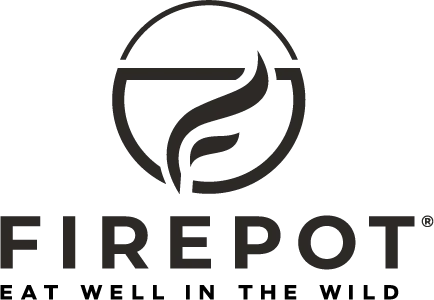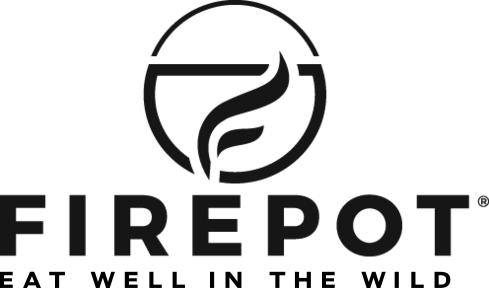Preparation
You can rehydrate your meal in one of two ways:
1. To eat directly from the pouch, simply boil the required amount of hot water, pour it in, seal the pouch using the ziplock at the top, stir and wait.
2. To cook your meal in a pan, tip the food into the pan, add cold water, bring to the boil, turn off the heat and wait.
Depending on the portion size you have chosen, you will need between 450ml and 600ml to rehydrate your Firepot.
You will find a clear indication of the water volumes required for each meal on the product page under 'More Details'.
The maximum total volume you'll require for one of our 'serves two' meals is 800ml, and you'll need to leave a little room for stirring.
To calculate the total volumetric weight of your meal, just add the dry weight of the food and the water required – for instance a 200g meal which requires 600ml water will equate to 800ml.
We intentionally set out to design a range of meals that could be rehydrated and eaten straight from the pouch wherever you are in the world, just by adding boiling water. However, rehydration does take longer at higher altitudes, and heat cools faster than normal in sub-zero conditions.
The best way to rehydrate food in these conditions is to follow the pan method on the packet. In extreme cold, it avoids the problem of pouches freezing before they are fully rehydrated.
Food
Dehydration in itself is a simple process. It involves taking an ingredient (or ingredients) and passing warm air over it at the right temperature in a controlled environment. In this environment the moisture evaporates from the food, reducing its weight by over 70%.
At Firepot, we prepare each of our meals by hand, and then we cook them in stages, just as you would at home. Once cooked, we transfer the meals to driers which were designed and built in-house. Standard commercial dehydrators work well for drying fruit and vegetables but are not powerful enough to safely dehydrate an entire pre-cooked meal. That is why we spent three years developing our own drying technology to capture the flavour of a home cooked meal, without any compromise in texture.
Both processes involve removing the water from food to preserve it. Freeze-drying involves freezing the food to a very low temperature and drying it in a vacuum to remove moisture. Dehydration involves passing warm air over the surface of the food to remove moisture. At Firepot we have opted for dehydration because we find it creates food that tastes like it should, with plenty of texture and flavour. It is an altogether slower and gentler process than freeze-drying.
The other major difference between our dehydrated meals and the majority of our freeze-dried competitors' is the fact that we cook all our food ourselves, by hand, using fresh ingredients and then dry each meal. Other companies buy in freeze-dried ingredients which they then mix together in the packet, hoping the flavours will combine by the time you add water — they don’t.
Dehydration has no impact on the nutritional value, no. Exposure to heat can bring out the vitamins in some ingredients and diminish them in others. At Firepot, we oven-cook a whole meal as you would at home, and then dry it slowly using warm air. The
drying process therefore has no bearing on the nutritional content of cooked ingredients.
We use as many local, fresh ingredients in our dishes as we can. When it comes to ingredients that are not fresh (for example, tomato purée or red wine vinegar), we take particular care to find options which don't contain any chemicals or preservatives. This means we can cut out anything artificial, and recognise exactly what goes into our meals.
As of the end of April 2023, we now have a five year best before date.
This doesn’t mean that the food won't last longer than five years, but we would recommend using it in that window to get the best-tasting result.
This also means that:
- If you have a Firepot sitting at home and your meal is dated 2017, the best before end (BBE) date can be extended to 2023.
- If your meal is dated 2018, the BBE date can be extended to 2024.
- If your meal is dated 2019, the BBE date can be extended to 2025.
- If your meal is dated 2020, the BBE date can be extended to 2025.
- If your meal is dated 2021, the BBE date can be extended to 2026.
- If your meal is dated 2022, the BBE date can be extended to 2027.
Our meals (165-200g) will serve one very hungry person on a calorie-demanding expedition, or two people sharing a meal. These are not the 300g portions you get in a packet of wet food, nor the slimmed-down portions you get from some of our competitors. When rehydrated, these weigh in between 615g and 800g — perfect for a satisfying and generous meal at the start or end of a long day.
The calorie content of our food varies across the recipe range: we make food that is nutritious and healthy rather than choosing a calorie target and then adding high-calorie ingredients until we reach it. Our range of main meals extends from 640kcal up to 850kcal.
This all depends on how much energy you are likely to burn, how often you are able to pick up supplies, and how often you are prepared to stop. If you are not on a schedule, you will probably be comfortable with a good breakfast, a light lunch, snacks throughout the day and a Firepot meal at night. If you are away for longer or expending a lot of energy, you may want to consider taking a regular portion for lunch and an extra-large for dinner.
Ingredients
No. Because we dehydrate our food and then store it in pouches which oxygen, moisture and sunlight cannot penetrate, we achieve a healthy shelf-life without the need for preservatives or high levels of salt. We do add a pinch of salt and a twist of pepper to our meals, but only to season, just as you would at home. You can find out more about our approach here.
Being based in rural Dorset, we can find almost everything we need fresh at our doorstep. We feel proud to be able to say that our British beef mince comes from farms in the South-West, and that all our vegetables come fresh from the local greengrocer in Chideock.
The Firepot range now offers 11 recipes for our vegan customers, and we have nine recipes which are gluten-free.
Whilst we do not use nuts in our recipes, we do use sesame oil so our kitchen is not completely nut-free.
In some cases we are able to adapt our recipes to suit other dietary requirements. For example, we have developed a keto range for previous customers, removed sugars and other ingredients, catered to FODMAP diets, and adjusted portion sizes. If you have a question about dietary suitability, please contact us for more details.
Packaging
When unfilled, our combined pouch + label weight typically comes in at 17g.
Our yellow pouches are made up of layers of aluminium film and plastic. This helps retain our shelf-life and doubles up as a handy bowl for your food. But the same elements which make these materials so attractive are also what make them detrimental to the environment - mixed materials can't be thrown into your household recycling.
In the UK we run a successful pouch recycle scheme where customers can return their used pouches by post, but it doesn't make environmental sense to offer this overseas.
We are working on a pouch which has the right heat and moisture barrier we need for our food, whilst still being recyclable.
Shipping
Estimated shipping times should be marked clearly on the Amazon product page. If you are a Prime customer, any orders placed before midnight should be delivered by 11am the next morning.
Amazon handles the fulfilment of our meals within the US. Whilst this brings obvious benefits, it does unfortunately mean that we are not in a position to assist with tracking enquiries. Please refer to Amazon's Customer Services for any queries regarding the status of your order.


